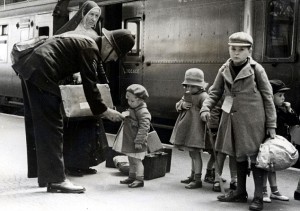 I am in the midst of a long-term project to document instances when empathy has flowered on a mass scale and shifted the course of human history. While empathy has periodically collapsed on a collective scale – just think of colonialism in Latin America or the Holocaust – there have also been moments when it has emerged as a force for positive and radical social change. If we want to tackle today’s global crises – from wealth inequality and armed conflict to climate change and food insecurity – we need to learn from the past and understand how empathy can be harnessed as a powerful tool to shift human behaviour and ignite social action. And one of the most interesting places to look is the evacuation of British children in World War Two. Continue reading
I am in the midst of a long-term project to document instances when empathy has flowered on a mass scale and shifted the course of human history. While empathy has periodically collapsed on a collective scale – just think of colonialism in Latin America or the Holocaust – there have also been moments when it has emerged as a force for positive and radical social change. If we want to tackle today’s global crises – from wealth inequality and armed conflict to climate change and food insecurity – we need to learn from the past and understand how empathy can be harnessed as a powerful tool to shift human behaviour and ignite social action. And one of the most interesting places to look is the evacuation of British children in World War Two. Continue reading
Category: empathy through experience
Why George Orwell is my empathy hero
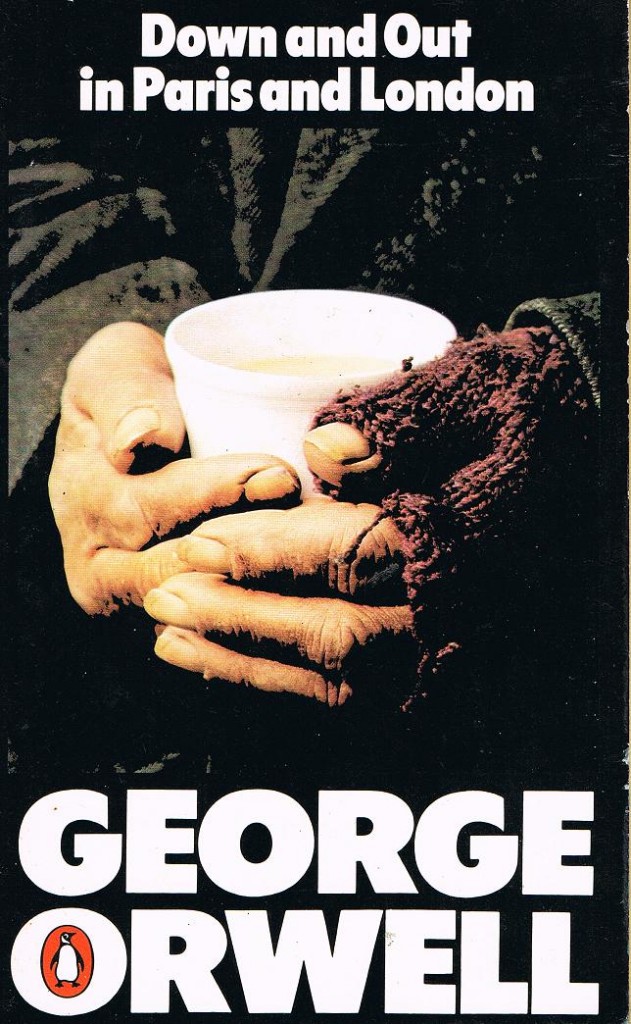 I was recently interviewed by The Browser – a fabulous site which compiles quality writing from around the web – about my five top books on the art of living. In the following extract I discuss George Orwell’s Down and Out in Paris and London, a book which has been a major inspiration for all my work on empathy.
I was recently interviewed by The Browser – a fabulous site which compiles quality writing from around the web – about my five top books on the art of living. In the following extract I discuss George Orwell’s Down and Out in Paris and London, a book which has been a major inspiration for all my work on empathy.
George Orwell’s Down and Out in Paris and London is your second choice. What does it teach us?
I think that Orwell was one of the great travel adventurers of the 20th century. The reason I think that is because in Down and Out in Paris and London he showed that empathy could become an extreme sport and the guideline for the art of living. It’s the second half of the book that I particularly like, in which he describes how he went tramping in east London. He would dress up as a tramp and go into the streets of London, fraternising with beggars and people living on the streets. He was trying to empathise with people who lived on the social margins. Continue reading
New Book! THE WONDERBOX by Roman Krznaric
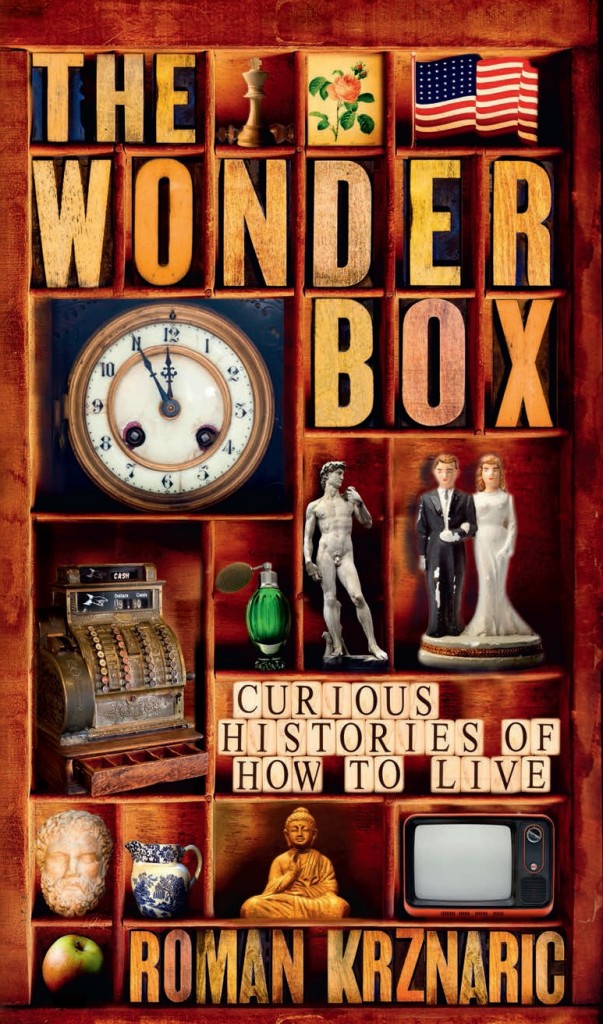 My new book, THE WONDERBOX: CURIOUS HISTORIES OF HOW TO LIVE (Profile Books), will be in bookshops from December 22 – just in time for a last-minute Christmas stocking filler.
My new book, THE WONDERBOX: CURIOUS HISTORIES OF HOW TO LIVE (Profile Books), will be in bookshops from December 22 – just in time for a last-minute Christmas stocking filler.
It’s about what the last three thousand years of human history can tell us about better living, and explores twelve universal topics, from work and love to money, creativity and empathy. What might we learn from the Ancient Greeks about the different varieties of love, from the industrial revolution about changing career, or from ancient Japanese pilgrims on the art of travel?
‘The Wonderbox is a cornucopia of delights. Completely fascinating, beautifully written and brimming with insights that challenge our entrenched and predictable ways of seeing and doing, it draws on an amazing range of stories from the history of human culture to explain how we can find true meaning in life. Every thinking home should have one!’ – Michael Wood, historian, broadcaster and author of The Story of England
Find out more about the book here. You can buy it from Amazon here.
The book is being launched with a series of five talks at The School of Life, Life Lessons from The Wonderbox, starting January 11 with ‘The Six Varieties of Love’.
Best wishes and happy reading!
Roman
The radical origins of compassion
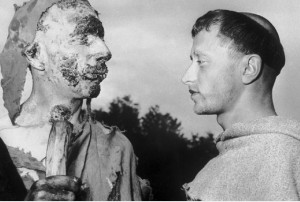 So you think compassion means being nice to people? Sure, its Latin root literally means ‘to suffer with another’, which is pretty close to the psychological concept of ‘affective empathy’, where you share in or mirror someone else’s emotional state. When I feel your pain or suffering, I may well do something to help you out.
So you think compassion means being nice to people? Sure, its Latin root literally means ‘to suffer with another’, which is pretty close to the psychological concept of ‘affective empathy’, where you share in or mirror someone else’s emotional state. When I feel your pain or suffering, I may well do something to help you out.
But there’s much more to compassion than that. It’s time we recognised it as a source of radical social change which can erode prejudice, create human bonds across social divides, and spur political action. A flowering of compassion was at the roots of the anti-slavery movement in the eighteenth century, the creation of organisations to tackle child poverty in the nineteenth, and countless other political initiatives. ‘So often when people hear about suffering in our world they feel guilty,’ says Desmond Tutu, ‘but rarely does guilt actually motivate action like empathy or compassion.’ Continue reading
How to be a Muslim, a Hindu, a Christian and a Jew
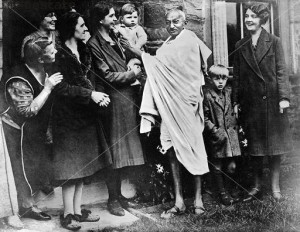 There is an intriguing thesis at the heart of Steven Pinker’s new book, The Better Angels of Our Nature. The Harvard psychologist argues – contrary to popular opinion – that humankind has become progressively less violent over the past few thousand years. We might feel surrounded by terrorism, civil wars and gun crime today, but murder and warfare is in fact on the decline. And the reason? One of Pinker’s key explanations is the rise of empathy as a force for social change: we are now more likely to look at the world through other people’s eyes, and consequently take action on their behalves. Continue reading
There is an intriguing thesis at the heart of Steven Pinker’s new book, The Better Angels of Our Nature. The Harvard psychologist argues – contrary to popular opinion – that humankind has become progressively less violent over the past few thousand years. We might feel surrounded by terrorism, civil wars and gun crime today, but murder and warfare is in fact on the decline. And the reason? One of Pinker’s key explanations is the rise of empathy as a force for social change: we are now more likely to look at the world through other people’s eyes, and consequently take action on their behalves. Continue reading
Helen Keller and the seeing hand
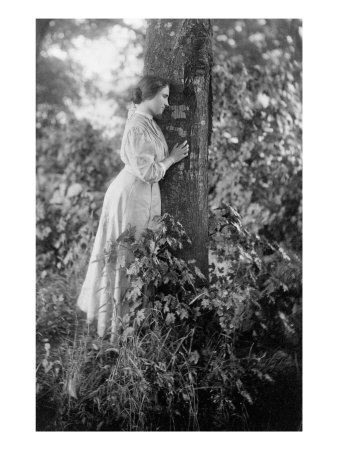 After being out of print for nearly a century, Helen Keller’s sensational collection of essays, The World I Live In, has recently reappeared in a variety of editions. Although her life is often remembered as an uplifting tale of personal triumph over extreme physical adversity, it is just as much an inspiration for how to expand our imaginations. By taking us on a journey into her dark and soundless world, her writings can help us rethink the nature of perception itself. Continue reading
After being out of print for nearly a century, Helen Keller’s sensational collection of essays, The World I Live In, has recently reappeared in a variety of editions. Although her life is often remembered as an uplifting tale of personal triumph over extreme physical adversity, it is just as much an inspiration for how to expand our imaginations. By taking us on a journey into her dark and soundless world, her writings can help us rethink the nature of perception itself. Continue reading
Why every city needs an Empathy Museum
 Just as the world’s major cities now have Holocaust Museums, it is time they all established Empathy Museums too. Their purpose would be nothing less than generating a new global culture of empathy by creating adventure spaces where you can explore how to view life from the perspective of other people.
Just as the world’s major cities now have Holocaust Museums, it is time they all established Empathy Museums too. Their purpose would be nothing less than generating a new global culture of empathy by creating adventure spaces where you can explore how to view life from the perspective of other people.
A typical Empathy Museum would not house dusty exhibits inside glass cases. Instead, it would be an exciting and intriguing playground rivalling the finest galleries and tourist attractions that the city has to offer. On rainy Sunday afternoons you might wander through the Empathy Museum with a few friends or your mother-in-law. During the week it is likely to be filled with children on school excursions and inquisitive visitors from countries where the ideal of empathy remains embryonic. The Empathy Museum will ignite the imagination just like the first public museums in the seventeenth century, whose collections of curiosities revealed the wonders of nature and human civilization for the first time. Continue reading
Who was the greatest Victorian traveller? A fish collector
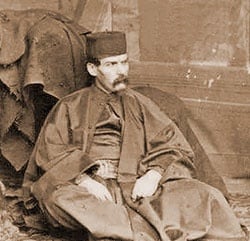
Who was the greatest traveller of the Victorian era? Amongst the usual top contenders you will find the name of Sir Richard Francis Burton. Best known for translating The Thousand and One Nights from Arabic and for visiting Mecca in 1853 disguised as a Muslim pilgrim, Burton wandered for years throughout the Middle East, Far East and Africa. He had an extraordinary talent for languages – he could speak twenty-nine of them – and was a master of assimilating himself into local cultures. Just after his death in 1890 he was described as ‘a Mohammedan among Mohammedans, a Mormon among Mormons, a Sufi among the Shazlis, and a Catholic among the Catholics.’ Continue reading
The Empathy Top Five: Who are the greatest empathists of all time?
The moment has finally come for the Outrospection blog to put its cards on the table and boldly declare who are the greatest empathists of all time. Our selection committee has been painstakingly deliberating over the choices for several months, and you might well be surprised by the results. No, Barack Obama does not appear in our top five, even though he believes ‘the empathy deficit’ to be the greatest scourge of modern society. And not even famed empathetic individuals such as the Dalai Lama, Mother Teresa or Jesus Christ have shown what it takes to make the grade. Continue reading
Five ways to expand your empathy
It is usual, at this time of year, to make a series of earnest New Year’s Resolutions which – by tradition – you resolutely fail to keep. Why not try promising yourself some New Year’s Explorations instead and widen your personal horizons.
Expanding your empathy might offer just what you are looking for. Empathising is an avant-garde form of travel in which you step into the shoes of another person and see the world from their perspective. It is the ultimate adventure holiday – far more challenging than a bungee jump off Victoria Falls or trekking solo across the Gobi desert.
Here are my five top tips for transforming yourself into an empathetic adventurer over the coming months. Continue reading